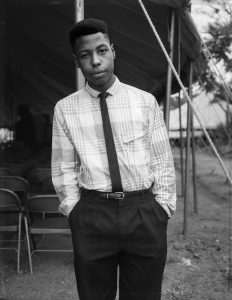Hilton Als in The New Yorker:
 He opened a book of Dawoud Bey’s photographs at random. The images were of people of color, not unlike himself, and what he loved about the images was how the subjects held their own self-validation in their hands, their eyes, without being reduced to an ideology—you know, equating blackness with nobility, that kind of thing. It was such a relief, to see works of art made out of real lives. The pictures named a world he knew, even as he struggled to understand it more. And, even though the pictures hadn’t been shot in Ferguson, Staten Island, or Cincinnati, they shimmered with lives—black male lives. Generally, the language around that familiar and unfamiliar form has little to do with his humanity and more to do with the pressure points—guilt, remorse, and so on—his dead or living self aggravates. And, because he’s less interesting in the context of joy, the continued violence to his body. Under his white shirt, he knew something about that. And this: that the violence inflicted on the black male body didn’t stop there but extended, of course, to his community, which includes mothers and brothers and all the people who never considered him invisible or trivial or tragic or extinguishable to begin with.
He opened a book of Dawoud Bey’s photographs at random. The images were of people of color, not unlike himself, and what he loved about the images was how the subjects held their own self-validation in their hands, their eyes, without being reduced to an ideology—you know, equating blackness with nobility, that kind of thing. It was such a relief, to see works of art made out of real lives. The pictures named a world he knew, even as he struggled to understand it more. And, even though the pictures hadn’t been shot in Ferguson, Staten Island, or Cincinnati, they shimmered with lives—black male lives. Generally, the language around that familiar and unfamiliar form has little to do with his humanity and more to do with the pressure points—guilt, remorse, and so on—his dead or living self aggravates. And, because he’s less interesting in the context of joy, the continued violence to his body. Under his white shirt, he knew something about that. And this: that the violence inflicted on the black male body didn’t stop there but extended, of course, to his community, which includes mothers and brothers and all the people who never considered him invisible or trivial or tragic or extinguishable to begin with.
In those family members’ eyes—the eyes of love, of complicated fraternity—he is a very real thing, attached to names given by parents or mothers or grandparents. Every name comes with a story dear to those who have bestowed it on the generations that come after, just as people attached great importance to Michael’s name, and Eric’s name, and Samuel’s name. In the library, he struggled to find the love and meaning in his own real name, since so many people said he was invisible. He’d once read that, years ago, Toni Morrison, when asked her opinion of Ralph Ellison’s “Invisible Man,” had said that, while she was unqualified in her praise of Ellison’s artistry, one question remained, hung fire: Who was he invisible to? Not to her. He was her brother, her father, her friend, and now, looking at Bey’s lens, he conveyed the satisfaction of being seen, which is a form of brotherhood and love, too.
More here.
